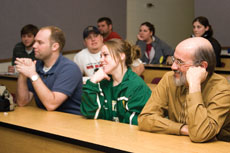Seminar class focuses on death

Charles Grife (left), senior chemistry major; Carissa Knoderer, junior biology major; and Dr. Jim Jackson, professor of biology, participate in a discussion on Feb. 21.
There is a class at Missouri Southern devoted to the study and discussion of death.
“This class is a modification of a course called seminar,” said Dr. Jim Jackson, professor of biology and instructor of the course. “The one unifying topic that I thought in medicine as far as a current topic was death. As Americans, we are both medically and biologically opposed to the idea of death.”
He said one of the many goals of this class is to prepare students with an understanding about death.
“What with the ramifications of the Terry Schiavo case last year,” Jackson said, “I realized that we weren’t even preparing our students with an understanding about end of life decisions.”
Class topics range from the death of cells and the death of an organism to how society interacts with death and then to what students personally believe about ethics and morality regarding the subject.
Among recent topics discussed in the class are assisted suicide and physician-aide in executions.
“Everyone in the class is pretty young,” said Charles Grife, senior chemistry major. “Most of us haven’t even thought about death. This class gives us a primer on what we can look forward to.”
Many benefits can come out of talking about this not-so-popular subject, Jackson said.
“In general, as citizens, I think we need to take a topic that is another in a series of important events in life that should be talked about in order to get comfortable with it,” he said. “I think that it’s a bias in society to not want to study death and I’m hoping that this course can change that.”
For Katherine Miller, freshman pre-med major, the class has another benefit.
“Definitely going into a medical profession, its necessary to recognize some of the nay situations you may be faced with,” she said. “In no matter what kind field you go into, you’re going to see death. You have to learn that there are moral, ethical and logical ways of dealing with that. These discussions make you think about whether you want and would look at certain issues ethically, logically or morally.”
Jackson said there have been many “charged and interesting” discussions about the subject.
“There’s a whole lot of people in this class with great ideas,” he said. “You can just sit there and look at them and see that they’re about to say something unique.”
Jackson hopes students get one thing out of this course.
“Hopefully, as these conversations go along, people will understand how to make moral and ethical decisions based on sound logic and ethical principles,” Jackson said.
Your donation will support the student journalists of Missouri Southern State University. Your contribution will allow us to purchase equipment and cover our annual website hosting costs.



























